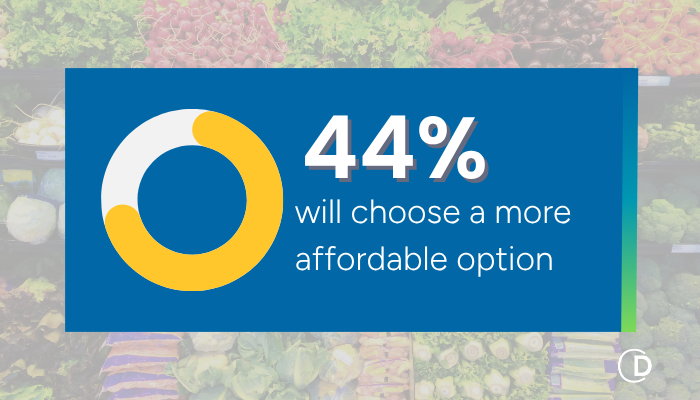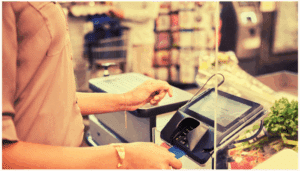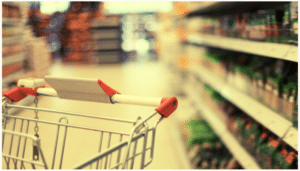Navigating Tariffs: A Grocer’s Guide to Price Optimization is Uncertain Times
Reading Time: 17 Minutes
Learn how you can protect margins while maintaining customer loyalty during tariff uncertainty with data-driven pricing optimization strategies.
ClearDemand’s price optimization and competitive intelligence solutions offer a sophisticated approach to tariff-driven pricing challenges.
Rather than implementing knee-jerk price hikes or absorbing unsustainable costs, you can leverage market shifts to strengthen your position.
As we are all painfully aware, tariffs are disrupting the grocery sector, affecting up to 40% of U.S. trade and 15% of the food supply. Fresh categories bear the heaviest burden – 32% of vegetables, 55% of fruits, and 94% of seafood face potential price pressures. For grocers, this creates a multi-dimensional challenge beyond simple cost increases. Major retailers, like Walmart, have indicated they plan to raise prices in response to tariff-induced cost increases.
From our perspective, tariffs add a layer of unpredictability to a job that already juggles margins, fierce competition, and demanding consumers. It’s not just the cost increases themselves – but the ripple effects they create. Many of our customers have shared that they’re looking for visibility: What’s changing in the market? How are competitors pricing? Where is their pricing power (and where should they play defense)? What we know – is retailers need pricing analytics and optimization to model demand, simulate scenarios, and collaborate with merchants without losing the big picture.
In this guide, we examine how tariffs impact your business, how shoppers respond to price changes, and what data-driven capabilities you need to make optimal pricing decisions. You’ll learn how leading grocers use advanced analytics to protect margins while maintaining customer loyalty in uncertain times—and how you can, too.
The Tariff Challenge: How Import Taxes Impact Your Business
You’re navigating a complex decision matrix: Do you absorb rising costs or pass them along? Will competitors hold firm or raise prices? How will these decisions affect category performance and customer loyalty?
According to the National Retail Federation, 70% of independent retailers expect to raise prices – but this reactive approach may sacrifice long-term competitiveness for short-term margin protection.
All of this comes at a time when food prices are already under pressure. According to USDA’s April 2025 Food Price Outlook, overall food prices are expected to rise 3.5% in 2025 (faster than the historical average). Food-at-home prices specifically are predicted to increase by 3.2%, above the 20-year historical average of 2.6%.
Tariffs add another layer of complexity to an already challenging pricing environment.
How Do Shoppers Respond to Tariff-Driven Price Changes?
When prices climb, shoppers actively adapt their behavior in ways that can significantly impact your business.
Recent CivicScience data shows consumer concern about tariffs is growing significantly. 23% of survey respondents said they will buy from their favorite brand less often, 44% said they will choose a more affordable option altogether, and only 18% say they will continue purchasing as usual.

The Mission-Based Shopper
Gone are the days when most customers grabbed everything during a single trip. A growing number of shoppers visit multiple stores in search of the best deals, resulting in smaller baskets and shorter visits. Dubbed “mission-based shopping,” this trend was an established practice for some consumers, but tariff-driven price increases are making it more common.
For grocers, this means every price point and promotion must work harder. When tariffs push up the cost of popular items like chocolate chip muffins or imported coffee, customers notice – and they respond in predictable ways.
Trade Down
When faced with higher prices, many shoppers look for alternatives, typically pivoting from national brands to private label options or less expensive alternatives within a category. Back in 2020, McKinsey research showed that 45% of consumers increased private label purchases due to inflation. Tariffs are expected to accelerate and complicate this trend. Many private brands rely on imported ingredients too, so they aren’t immune to tariff impacts. The cost gap advantage that private labels traditionally enjoy may erode, making your pricing decisions even more critical.
Walk Away
In categories where price increases are significant, some customers simply abandon the purchase altogether. Understanding which items are “must-haves” versus “nice-to-haves” in your shoppers’ baskets becomes crucial to maintaining overall transaction values.
Seek Promotions
Bargain hunting is more aggressive during periods of price volatility. Shoppers are more responsive to promotions, but not all promotions deliver equal value. Some may cannibalize full-price sales without bringing in new customers, while others might drive genuine category growth.
The Cross-Category Impact
Perhaps most importantly, tariff-driven changes don’t happen in isolation. When shoppers adjust their behavior in one category, it affects others. For example, if coffee prices increase due to tariffs, this might impact complementary categories like creamers, sweeteners, or breakfast items.
Understanding these behavioral shifts is critical for developing a pricing strategy that protects both your margins and your customer relationships during tariff uncertainty. The right data and analytics tools can help you predict these responses with precision and help you anticipate changing shopper behavior rather than simply reacting to it.
Tariffs, cost surges, competitor shifts, and shopper volatility can make even seasoned pricing teams feel like they’re playing defense.
At ClearDemand, we help retailers move from reactive to resilient.
The ClearDemand Advantage: Data-Driven Resilience
Respond strategically to market shifts! Unlike basic pricing tools that simply apply cascading price updates, we deliver a comprehensive and nuanced approach to tariff challenges.
“Retailers shouldn’t have to choose between profitability and competitiveness. A strong rules-based approach lets them achieve both – without sacrificing control.” — Sarah Stockton, VP Product at ClearDemand.
Elasticity Modeling That Works
Our granular elasticity models help you understand how demand shifts with price at the item, category, and store level. With frequent remodeling that doesn’t incur extra fees, you’ll have up-to-date insights that reflect current shopper behavior, not last quarter’s patterns. You can run unconstrained simulations that reveal true demand drivers before applying stricter rules.
Competitive Intelligence in Real-Time
When competitors’ pricing responses vary widely, you need market intelligence to make smart moves. ClearDemand tracks competitor prices, promotions, and assortment changes in real-time, helping you identify price increases. Strategic alerts tell you when to respond—and when holding the line might actually gain market share.
Cross-Category Optimization
Tariff pricing decisions must extend beyond individual SKUs. ClearDemand supports cross-category optimization, which helps you offset margin losses in one area by capturing gains in another while tracking against your financial goals. Our cannibalization and demand modeling provide visibility into how changes in one item affect others, especially critical when not all products face the same cost increases.
Questions Every Pricing Leader Should Be Asking:
- How do I know if a price increase will hurt my volume or margins?
- How are my competitors reacting – and how should I respond?
- Are there halo or cannibalization effects that I need to account for?
- How do I make price changes that align with my financial goals (and business rules)?
- How often are the models updated? How do I know I can trust them?
Without clear answers to questions around elasticity, competition, and shopper behavior, pricing becomes guesswork. These questions ensure decisions are rooted in data, not gut reactions.
Our elasticity modeling, competitive insights, and optimization tools are built on real retail data. And, whether it’s avocados or coffee, we can simulate shopper behavior, margin tradeoffs, and promotional impact before you take action.
Next Steps: Getting Started with Your Tariff Strategy
For a limited time, we’re offering qualified grocery retailers a Free Tariff Impact Benchmark that delivers immediate value with actionable insights:
- A snapshot of pricing and promotions on key categories like seafood or beverage/coffee
- Side-by-side comparison of your pricing against regional and national competitors
- A custom consultation with our pricing experts to understand your opportunities and risks
We’re here to help your pricing team stay adaptable and confident… even as market conditions continue to change. Contact us today to see your data in action!
—
References:
https://cleardemand.com/request-a-demo/
https://cleardemand.com/retail-solutions/
https://cleardemand.com/platform/who-benefits/
https://www.cnbc.com/2025/05/31/trump-tariffs-here-are-the-retailers-raising-prices.html
https://www.cnbc.com/2025/05/20/walmart-price-increases-trump-tariffs.html
https://cleardemand.com/uncover-hidden-profits-with-powerful-category-analysis/
https://nrf.com/research-insights/forecasts/nrf-2024-annual-retail-sales-forecast-faq
https://www.ers.usda.gov/data-products/food-price-outlook/summary-findings
https://civicscience.com/tariff-anxiety-grows-as-consumers-weigh-spending-trade-offs/
https://www.sciencedirect.com/science/article/abs/pii/S0148296315003549
https://americanbakers.org/events/2025-tariffs-what-expect
https://www.cbsnews.com/news/tariffs-coffee-price-trump/
https://www.circana.com/post/from-growth-to-transformation-the-u-s-cpg-private-label-story
https://cleardemand.com/precision-pricing-measuring-true-incremental-value/
https://theorg.com/org/clear-demand/org-chart/sarah-stockton
https://cleardemand.com/company/
https://www.investopedia.com/terms/p/priceelasticity
https://cleardemand.com/ebook/retail-guide-buying-compet-intel-platform/
https://www.investopedia.com/terms/m/marketcannibilization.asp
https://cleardemand.com/retail-category-benchmark/
https://cleardemand.com/webinar-recap-why-grocers-need-flexible-pricing/
The Latest Insights – Straight to Your Inbox
Sign up for the ClearDemand mailing list for actionable strategies, upcoming events, industry trends, and company news.














